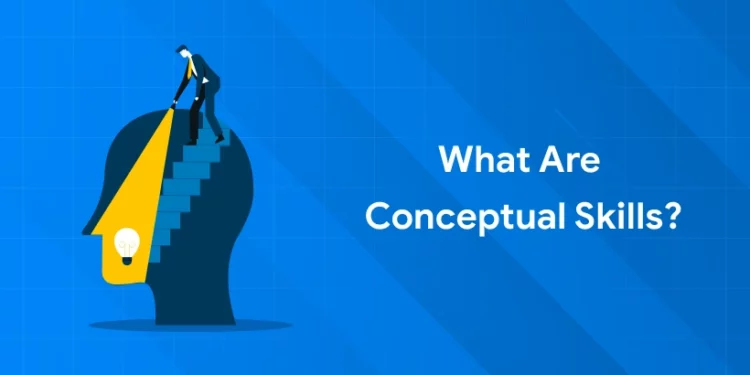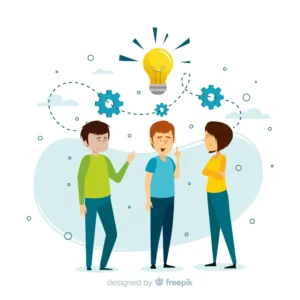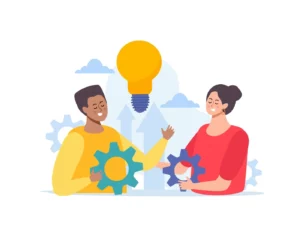Table of Contents
Key Takeaways:
- Conceptual skills help you think broadly, connect complex ideas, and make strategic decisions.
- These skills complement technical and interpersonal skills, with growing value as you advance.
- Practical development involves analytical exercises, systems thinking, creativity, and learning from diverse fields.
- You can showcase these skills on your resume and in interviews by highlighting strategic achievements and thought processes.
- Cultivating conceptual skills lays the foundation for leadership, innovation, and effective problem-solving.
Introduction: Why Conceptual Skills Are Your Career’s Secret Weapon
In a world where jobs are evolving faster than ever and industries are becoming more interconnected, the ability to grasp complex ideas and see beyond immediate tasks is invaluable. Imagine trying to assemble a puzzle without knowing what the final picture looks like — this is where conceptual skills come into play. They allow you to understand the bigger picture, decipher relationships between different elements, and make decisions that positively affect the whole system.
Whether you’re stepping into your first role or aiming for a leadership position, conceptual skills can elevate how you approach challenges and opportunities. These skills help you innovate, strategize, and anticipate outcomes, making you an indispensable asset to any team or organization. This blog guides you through what conceptual skills are, why they matter, real-life examples, and proven ways to develop and highlight them throughout your career journey.
What Are Conceptual Skills?
Conceptual skills are the mental abilities that enable you to visualize the broad scope of a situation, identify complex patterns, and understand how various pieces of an organization or system connect. They go beyond simple task execution, focusing on abstract thinking and strategic planning. In practical terms, conceptual skills involve analyzing information, imagining potential scenarios, and identifying the root causes or ripple effects of a decision.
For instance, if technical skills are about knowing how to use a tool, conceptual skills are about knowing which tool to use, when, and why. These skills are vital for managing complexities in business processes, designing innovative solutions, or planning long-term growth strategies. Unlike technical skills that involve specific knowledge or procedures, conceptual skills are more about holistic understanding and less about routine activities.
Also read: Top Personality Development Tips
Boost Your Skills & Kickstart Your Career!
Employability and Personality Development Course by Entri App: Enhance your communication, confidence, and job-ready skills to excel in your career.
Join Now!Why Do Conceptual Skills Matter at Work?
Conceptual skills are crucial because they empower you to approach problems with a broad, strategic outlook. Rather than getting caught up in minutiae, these skills enable you to:
- Make informed decisions that consider both immediate impacts and long-term goals.
- Innovate effectively by linking ideas from different domains to create new solutions.
- Adapt quickly when unpredictable changes occur because you understand underlying structures and relationships.
- Collaborate across departments by seeing how different functions support common objectives.
Because of these benefits, employees with strong conceptual skills often become key contributors and are fast-tracked for leadership roles. Even entry-level professionals gain an edge by demonstrating awareness of how their work aligns with bigger goals.
Also read: Communication Skills for Success in Workplace
Types of Conceptual Skills You Need to Master
Understanding the various types of conceptual skills helps in identifying which areas to develop. Core conceptual skills include:
- Analytical Thinking: Breaking down complex information into parts to understand it better and solve problems logically.
- Critical Thinking: Evaluating assumptions, arguments, and data objectively to make sound judgments.
- Problem-solving and Decision-making: Creating efficient solutions by weighing options and anticipating consequences.
- Creative and Innovative Thinking: Coming up with original ideas and approaches to challenges.
- Strategic Thinking: Setting long-term goals and developing plans that align with overall organizational objectives.
- Systems Thinking: Viewing an organization or process as an interconnected whole and understanding how changes in one part affect others.
- Abstract Reasoning: Handling ideas and concepts that are not tied to concrete realities, useful in planning and forecasting.
- Cognitive Flexibility: Shifting your perspectives or strategies when faced with new information or changing contexts.
Together, these skills enable professionals to navigate uncertainty and complexity with confidence.
Conceptual Skills, Technical Skills, and Interpersonal Skills — What’s the Difference?
| Skill Type | What It Means | Where It’s Most Important | Example |
|---|---|---|---|
| Conceptual Skills | Big-picture thinking, strategy | Leadership, project management | Designing a company-wide digital transformation |
| Technical Skills | Task-specific knowledge | Execution, specialist roles | Coding a new software feature |
| Interpersonal Skills | Communicating and building relationships | Team collaboration, client interaction | Mediating a conflict between coworkers |
Boost Your Skills & Kickstart Your Career!
Employability and Personality Development Course by Entri App: Enhance your communication, confidence, and job-ready skills to excel in your career.
Join Now!Real-World Examples of Conceptual Skills in Action
- Marketing Campaign Planning: A marketing manager analyzes customer behavior, industry trends, and company goals to design a campaign that increases market share. By seeing these elements interconnect, she can create messaging that resonates and select channels for maximum reach.
- Operations Optimization: An operations leader studies the workflow of a manufacturing plant, identifies bottlenecks, and redesigns processes that reduce production time and costs by 30%. This requires understanding both individual steps and systemic effects.
- Healthcare Administration: A hospital administrator assesses patient inflow patterns, staff availability, and resource utilization to improve scheduling and reduce wait times. She applies systems thinking to align various departments and enhance patient care efficiency.
These scenarios illustrate how conceptual skills translate to practical improvements with real impact.
Proven Steps to Develop Your Conceptual Skills
Building conceptual skills is an ongoing process that benefits from deliberate practice:
- Engage in Analytical Practices: Work on case studies or projects that require breaking down data and complex information.
- Ask Big-Picture Questions: Make it a habit to think beyond your tasks by asking: “How does this fit into the overall goals?” or “What are the long-term effects?”
- Study Systems Thinking: Use diagrams or process maps to visualize how different components in your organization or project relate.
- Take on Cross-Functional Projects: Volunteer for initiatives that require teamwork across departments or skill sets, exposing you to broader perspectives.
- Boost Creativity: Participate in brainstorming sessions, experiment with new problem-solving methods, and stay open to unconventional ideas.
- Read Widely: Expand your knowledge beyond your immediate field to include economics, psychology, technology, and more. This helps connect ideas innovatively.
- Seek Mentorship: Learn from leaders and mentors who consistently use strategic thinking in their roles, ask for feedback, and model your approach on theirs.
Consistency in these habits gradually enhances your ability to think conceptually.
How to Showcase Conceptual Skills on Your Resume
To demonstrate your conceptual skills on your resume:
- Use strong keywords like “strategic planning,” “systems analysis,” “conceptual problem-solving,” and “innovation.”
- Frame your experiences as achievements that show impact, for example, “Redesigned workflow that increased team productivity by 20%.”
- Incorporate these in various sections: a compelling summary statement highlighting your strategic mindset, a skills section listing related keywords, and specific job achievements that detail your role in strategy or innovation.
Crafting your resume this way catches the eye of recruiters looking for candidates with vision and problem-solving abilities.
You might also like: Top Communication Skills for A Resume (With Examples)
Demonstrating Conceptual Skills in Interviews
Interviewers evaluate conceptual skills through scenario or problem-solving questions. Effective ways to showcase your skills include:
- Applying the STAR method (Situation, Task, Action, Result) to tell focused stories explaining how you analyzed a situation, considered different approaches, and delivered a big-picture solution.
- Highlighting your thought process clearly: how you weighed options, anticipated outcomes, and adapted to new information.
- Emphasizing results that went beyond immediate fixes to improve broader operations, customer experience, or team dynamics.
Practice articulating your strategic thinking through examples relevant to the job you want.
Conceptual Skills in Leadership and Management
As you move into leadership, conceptual skills become essential. Leaders use these abilities to:
- Set compelling visions and long-term goals that inspire teams.
- Manage complex change processes by anticipating impacts and aligning resources effectively.
- Coordinate cross-departmental efforts to ensure everyone is pulling in the same direction. Developing conceptual skills early on prepares you to step confidently into these roles and guide organizations through uncertainty and growth.
Common Misunderstandings About Conceptual Skills
- Myth: Only executives need conceptual skills. In reality, workers at all levels benefit because these skills improve decision-making and problem-solving daily.
- Myth: Conceptual skills are too theoretical. They are practical tools that support innovation, efficiency, and strategic alignment in everyday work.
- Mistake: Ignoring the big picture because it seems less urgent. This limits career progression and reduces your ability to contribute meaningfully.
Understanding these myths helps keep your skill development on track.
Elevate Your Career with Entri’s Career Level-Up Course
If you want to boost your professional persona, communication, and strategic thinking, Entri’s Career Level-Up course is an excellent choice. This thoughtfully designed course helps you:
- Develop essential personality and interpersonal skills that employers seek.
- Learn effective communication, professional etiquette, and critical soft skills.
- Access placement assistance to improve your job search success.
- Gain confidence through practical exercises and expert guidance.
Invest in your future by enrolling today via Entri’s Career Level-Up Course. Taking this step can transform your career trajectory by complementing your conceptual skills with a strong personal brand.
Conclusion
Conceptual skills are the cornerstone of effective problem-solving, innovation, and leadership in today’s workplace. By understanding what they are and committing to developing them, you position yourself as a forward-thinking professional ready to tackle complex challenges and seize opportunities. Begin practicing these skills now to unlock new career possibilities and become the strategic thinker every organization values.
Embrace the power of seeing the big picture, and watch your professional growth soar!
Boost Your Skills & Kickstart Your Career!
Employability and Personality Development Course by Entri App: Enhance your communication, confidence, and job-ready skills to excel in your career.
Join Now!Frequently Asked Questions
Are conceptual skills innate or learnable?
They can definitely be learned and refined through practice, reflection, and exposure to diverse challenges.
How do conceptual skills benefit new employees?
They give newcomers perspective on how their work fits larger goals, allowing them to contribute effectively and advance faster.
What’s the difference between critical thinking and conceptual skills?
Critical thinking focuses on evaluating information thoroughly, while conceptual skills include that plus strategic vision, creativity, and systemic understanding.
Can non-managers highlight conceptual skills?
Yes, these skills are valuable at every stage and help you stand out regardless of role.
What’s a simple daily exercise to improve conceptual skills?
Regularly ask yourself how your tasks relate to bigger objectives and challenge yourself to see connections beyond immediate work.















